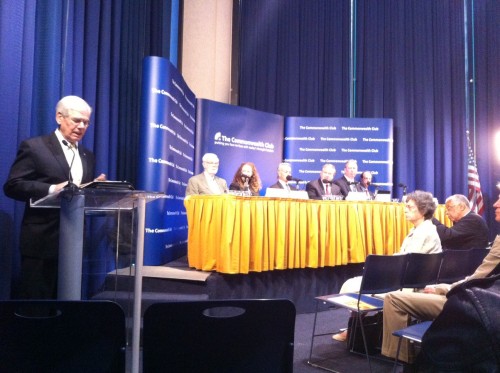
Experts discuss the future of transit in the United States during a summit held Friday at the Commonwealth Club in San Francisco. Photo by Jessica Schimm.
June 29, 2012
With public transit showing ridership at an all-time high, a transportation bill that could help to fund new projects for transit hit its 1,000 day in congress this week, where the house and senate continue to debate its merits.
The nation cannot afford any more extensions of the bill, said six transportation experts during a Commonwealth Club summit held Friday in San Francisco.
“Public transportation is on a tremendous roll right now, we are seeing ridership increases across this country like we haven’t seen in decades,” said Michael Melaniphy, president and CEO of the American Public Transportation Association. “Last year we saw the second highest ridership increase since 1957.”
The current transportation bill, TEA-21, was supposed to expire about 1,000 days ago. If it were to have been to expired, “the federal government could spend no more money on transportation, grinding projects across the nation to a halt,” said Dr. Asha Agrawal, director of the Mineta Transportation Institute’s National Transportation Finance Center.
Last year, 22 out of 28 local transit ballot measures nationwide passed. That’s 78 percent during some of the worst economic times the nation has seen, said Melaniphy.
Last year, Americans made 10.4 billion trips on transit. And, numbers showed a 5 percent increase in ridership in just the first quarter of this year in comparison to the first quarter of last year, Melaniphy said.
The numbers are jumping in all regions — urban, suburban and rural.
“People are flocking to public transportation, not just in big numbers, in record numbers,” Melaniphy said. “Oakland and San Diego set record ridership numbers.”
Various factors are contributing to a hike in ridership, including new “sexy” looking transportation vehicles, accessible WiFi and perhaps the biggest improvement – mobile phone apps, Melaniphy said. Other factors affecting motorists include rising gas prices, the threat of peak oil and a faltering economy.
Apps help to eliminate apprehension about riding public transit by displaying the real time schedule of public transit vehicles and fair rates, Melaniphy said.
The use of apps “is really exciting and has made the transit experience so much more inviting and welcoming,” Melaniphy said.
However, while ridership is up, the bill has had nine extensions and is approaching its possible 10th extension.
“Next week marks a thousand days since this transportation bill has expired,” said Melaniphy.
The average extension has been about 3.7 months, Melaniphy said.
That’s about as efficient as driving from San Francisco to New York with only three gallons of gas in the tank at a time, he said, explaining that it makes it incredibly difficult to plan any long-term projects.
Congress has passed smaller laws that allow for TEA-21 to be extended, which allow the US government to fund transportation at the same levels while also following the same rules in the past, Agrawal said.
“The goal is to stop these extensions (which provide no predictability of funding from year to year) with a new long-term bill,” said Agrawal.
A delay that long has consequences, said John Horsley, the executive director of the American Association of State Highway and Transportation Officials.
“We did a survey of our members in North Carolina for example, [they] said they had to delay 1.2 billion [dollars] in key projects because of uncertainty of the bill,” he said.
Furthermore, the Nevada Department of Transportation stopped its design work, not knowing whether the money will be there to complete it, Horsley said.
“The challenge and the reason why we haven’t had a bill in three years is because no one can figure out how to pay for it,” he said. “We’re spending out of the highway trust fund, about $52 billion each year, but the revenue coming in is only at about $36 (billion).”
The bill has been sustained only on reserves and transfers, and according to Horsley, “that can’t continue.”
“We’ve got to find an ongoing way to sustain the investment, and probably without raising taxes,” he said.
However, a sales tax on fuel is one possible option said Horsely.
“Transportation in this country provides jobs and access to jobs, it’s time to get this country back to work,” Melaniphy said.


 The Hunger Site
The Hunger Site
July 1, 2012 at 10:22 am
Update in the Kron. House passed an Amendment killing all funding for the project.
June 30, 2012 at 11:20 am
Jessica, could you do some follow up. I got a message from http://www.savemuni suggesting that federal funding for the Central City Subway was not going to be allocated. Thank you.